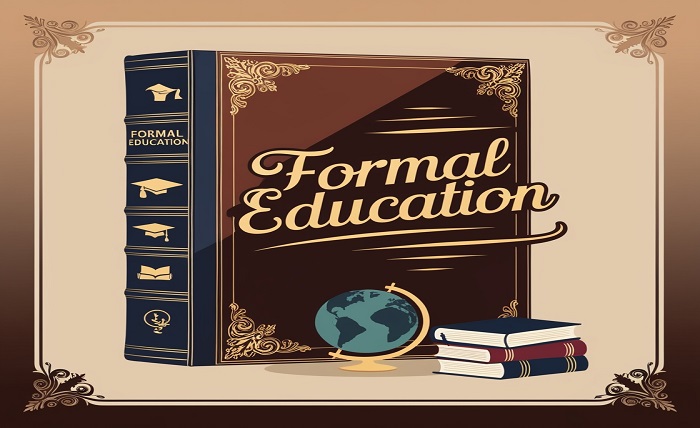The foundation of both individual and society development is education. Formal education refers to a certain kind of structured learning system, even if learning can happen anywhere and at any time. Its significance cannot be emphasized because it lays the groundwork for professional abilities, literacy, and social integration.
We’ll examine the idea of formal education definition in great detail in this post, including its definition, methods, and reasons for continuing to be relevant in a world that is changing quickly.
What is formal education definition?
Formal education is a systematic and structured approach to learning, typically delivered in institutions such as schools, colleges, and universities. It is guided by a predetermined curriculum, delivered by trained professionals, and often leads to certifications or qualifications.
The United Nations Educational, Scientific, and Cultural Organization (UNESCO) defines formal education as “education that is institutionalized, intentional, and planned through public organizations and recognized private bodies.”
Characteristics of formal education definition
There are various characteristics that distinguish formal education:
Institutional Framework: Training facilities, colleges, universities, and schools host it.
A structured curriculum: adheres to predetermined learning goals, topics, and assessment techniques.
Qualified Teachers: Instructors, instructors, and trainers receive specialized training for their positions.
Certification and Grading: Upon completion, learners receive certifications after being evaluated and graded.
Age and Progression Levels: It frequently entails moving from one level (primary, secondary, tertiary) to another based on age.
Legal and Social Recognition: Employers and governments alike formally recognize degrees and diplomas.
Historical Evolution of formal education definition
Over the centuries, changes in politics, religion, and culture have shaped formal education.
Ancient Civilizations: Elite schools were founded in Mesopotamia, Egypt, and Greece, marking the beginning of formal education.
During the Middle Ages: monasteries and madrassas that provided theological and other instruction were important religious establishments.
Modern educational: systems were made possible by the Renaissance and Enlightenment, when the emphasis shifted to the humanities, sciences, and the arts.
Industrial Revolution: By focusing on technical and practical skills, educational systems broadened to encompass the general public.
Modern Era: With the implementation of mandatory schooling laws in the majority of nations, universal education became a top objective.
formal education definition Systems’ Organization
Generally, formal education systems are separated into many stages:
Early childhood education includes preschool and kindergarten.
Primary education is a type of basic education that emphasizes fundamental abilities like reading and math.
By adding specialized disciplines, secondary school builds upon primary education.
Higher education at colleges and universities that frequently results in professional certifications is known as tertiary education.
Programs for lifetime learning and skill development are referred to as adult and continuing education.
The advantages of formal education definition
There are many benefits to formal education:
A structured learning environment guarantees the methodical accumulation of knowledge.
Social interaction: Promotes networking and learning among peers.
Acknowledgment: Certifications improve job opportunities and employability.
The development of skills focuses on interpersonal, technical, and cognitive abilities.
Research Foundation: Promotes investigation, analysis, and creativity.
formal education definition Drawbacks
Despite its advantages, formal education has many drawbacks.
A rigid curriculum might not accommodate different interests or learning styles.
High Costs: Getting a good education can be costly.
An excessive: focus on grades may cause stress and lower intrinsic drive.
Limited Exposure to Practice: Some systems prioritize theory above practical implementation.
Inequality: Access and quality may be impacted by socioeconomic circumstances.
The Differences Between Non-Formal and Informal Education and Formal Education
It is essential to comprehend the differences between various forms of education:
Formal education is organized, based in an institution, and results in certification.
formal education definition is learning without a formal curriculum through real-world experiences.
Non-Formal Education: Workshops and online courses are examples of structured learning that takes place outside of conventional educational settings.
Technology’s Place in Contemporary formal education definition
Formal education has been transformed by technology in many ways:
accessibility and flexibility are provided by the platforms for online learning.
Digital Classrooms: Use multimedia resources to increase student involvement.
Artificial Intelligence: Customizes educational opportunities.
Virtual reality: Offers immersive, practical educational experiences.
Global Collaboration: Links instructors and students around the world.
Views from Around the World on formal education definition
Around the world, formal education has different structures and priorities.
Western education emphasizes innovation, creativity and critical thinking. Western schooling emphasizes innovation, creativity, and crucial questioning.
Asian education frequently places a strong emphasis on rote learning, discipline, and high academic standards.
Developing nations: Face challenges with resources and access, but are making quick progress.
The Nordic Model is notable for emphasizing student welfare, free education, and equity.
Conclusion
formal education definition is still essential to the advancement of society. Despite its difficulties, its methodical approach gives people the credentials, abilities, and information required to succeed in a variety of fields. Education systems must adapt to the changing needs of the globe by embracing innovation and diversity.
FAQ
What is formal education definition main objective?
The main objective is to offer organized education that gives people the credentials, abilities, and knowledge they need to succeed both personally and professionally.
What are the differences between informal and formal education definition?
Informal education is unstructured and happens via everyday experiences, whereas formal education is structured, institution-based, and leads to certification.
Does success require a formal education definition?
Formal education offers possibilities and core abilities that can greatly improve one’s job prospects, but it is not the sole route to success.
What obstacles do formal education systems in developing nations face?
Lack of teachers, inadequate infrastructure, restricted access, and budgetary limitations are among the difficulties. phrazle answer today
How is formal education definition being impacted by technology?
Innovative teaching techniques like online courses and virtual classrooms are made possible by technology, which also improves accessibility and personalizes learning.

